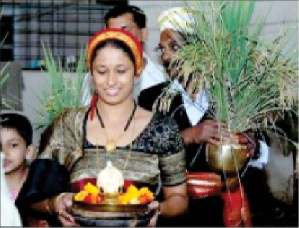
Preserving ones’ customs and traditions in the tangle of cross-cultural globalisation
It takes little to spark an inferno when it comes to community, beliefs and opinions. A seemingly innocent query into the relevance of old culture in our fast evolving modern day, turned foul when the enquirer stated his own sentiment. While he was happy to be associated with the community on its dedicated social networking forum, his views strongly suggested abandoning all traditional customs. Naturally, all hell broke loose and while the moderates tempered the situation, a question loomed: “Who are we, without our traditions?”
Far from our land of origin, far from the security of the familiar and most things we can call our own, this question becomes paramount to our sense of identity. At work, on campus and in cosmopolitan company, we don the culture of our residence to the best of our ability. But behind our private doors, we centre on preserving that identity — that single thing which is us, that which is unchallenged and that which no document can list otherwise.
For some, it is effortless. Others must adapt for the sake of survival. It is this duality that makes us versatile. And it is in a foreign land that the sweet smell of boiling rice becomes sweeter and that piece of ancestry, locked away unseen for years, becomes the most prized possession.
Because, it is when we are away that we realise just how close we are to our roots. How much they make us who we are. And how much we really love where we come from. When I relocated to London, I was young and brought up to be a well-rounded Indian. We celebrated all festivals and ate anything. Revelries were taken for granted. Time was an entity to be acutely aware of, not counted. Very quickly, the clinical regimentation of western routine made every little breath, matter. Birthday celebrations were postponed to the next official holiday. Festivals became organised events to be collectively enjoyed. Traditional practices had to be consciously performed, lest they be forgotten, in the rush to beat time.
I appreciated, more and more, all the things that I had taken-for-granted all my life. I was very happy. But something else mattered more. In a multinational gathering, being Indian, was great. But in the midst of other Indians, I needed my own, even more distinct identity. I had one. And proud as I was of it, I, now, felt the need to urgently learn the threads of preserving this heritage.
And so I observed all the rituals that I, until then, had only merrily enjoyed. I started speaking more in our language so that my child would gain fair exposure to it. I cooked traditional food in the house, often. We attended every community get-together. I made sure that I made the community ‘familiar’ to my child, to ensure that he was as natural in being who he was, as his roots were natural to his being. Traditions define us. Customs identify us. Beliefs set us apart. But in a foreign land, these very things bring us together and keep us so. That’s why, consciously or sub-consciously, we find every means to protect them. To make the future so secure, that no generation yet to come, will ever lose its way in the tangle of cross cultural globalisation. And so, we survive. Microcosmically. Wholesomely.
source: http://www.starofmysore.com / Star of Mysore / Home> Feature Articles / by Tejaswi Uthappa / May 06th, 2013

